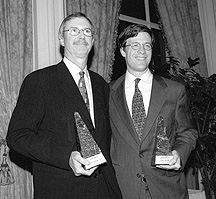![]()
|
|
|
|
|
Federal Judge Holds AT&Tís Mandatory Arbitration Clause Unconscionable and UnenforceableTLPJ's Co-Lead Counsel Named
San Francisco's
|
 Jim Sturdevant and Karen L. Hindin of The Sturdevant Law Firm, Consumer Action Executive Director Ken McEldowney, plaintiff Darcy Ting, and TLPJ's F. Paul Bland, Jr. Photo by Victoria Ni. |
The co-lead lead counsel in Ting v. AT&T -- F. Paul Bland, Jr., of Trial Lawyers for Public Justice and Jim Sturdevant of The Sturdevant Law Firm in San Francisco -- were named 2002 Trial Lawyers of the Year by the San Francisco Trial Lawyers Association on April 10, 2002, for winning a landmark arbitration victory in TLPJ's class action lawsuit on behalf of seven million California consumers against AT&T. On January 22, 2002, in a detailed published decision, San Francisco Federal Magistrate Judge Bernard Zimmerman found that AT&T had effectively tried to eliminate its long distance customers' rights by inserting a broad new mandatory arbitration provision in its form contract with them.
The decision in Ting v. AT&T concludes, "AT&T sought to shield itself from liability . . . by imposing Legal Remedies Provisions that eliminate class actions, sharply curtail damages in cases of misrepresentation, fraud, and other intentional torts, cloak the arbitration process with secrecy and place significant financial hurdles in the path of a potential litigant. It is not just that AT&T wants to litigate in the forum of its choice Ė arbitration; it is that AT&T wants to make it very difficult for anyone to effectively vindicate her rights, even in that forum. That is illegal and unconscionable and must be enjoined."
"This decision confirms what we have said all along: AT&T is trying to abuse the arbitration process to eliminate its long distance customersí rights," said TLPJ Staff Attorney F. Paul Bland, Jr., co-lead counsel in the case. "The courtís opinion vindicates the rule of law. AT&T and other companies cannot use mandatory arbitration to strip consumers of their legal rights."
 The San Francisco Trial Lawyers Association named Jim Sturdevant and F. Paul Bland, Jr., Trial Lawyers of the Year on April 10, 2002, for their class action victory for consumers in Ting v. AT&T. Photo by S. Todd Rogers. |
The suit, Ting v. AT&T, is a class action on behalf of all AT&T long distance telephone customers in California. The named plaintiffs in the case are Darcy Ting, an AT&T customer who lives in Berkeley, and Consumer Action, a San Francisco-based, national public interest organization. The court held that AT&Tís mandatory arbitration provision is unlawful under California consumer protection laws, and permanently enjoined the arbitration and limitation on liabilities provisions of AT&Tís contract from taking effect. AT&T has appealed the decision to the U.S. Court of Appeals for the Ninth Circuit.
"The court held that consumers have to be able to hold this communications giant accountable," said co-lead counsel James C. Sturdevant of The Sturdevant Law Firm. "AT&T doesnít deserve special treatment that trumps the basic consumer rights under California law Ė your right to tell the press about your dispute and its resolution; your right to join with other wronged consumers in a class action; and your right to an appropriate amount of damages necessary to compensate the consumers and punish corporate misconduct."
The court held that AT&Tís "ban on class actions is substantively unconscionable." Pointing to a rich factual record, the opinion states that this provision would "serve to shield AT&T from liability even in cases where it has violated the law." The court also struck down language in AT&Tís service agreement that would prohibit arbitrators from awarding punitive and other damages provided by California law. In addition, the court declared illegal AT&Tís provision seeking to impose a two-year limitations period for customers to file any claim in arbitration, even though the limitations provisions included in Californiaís consumer protection laws are typically three or four years. The court further found that "the implications of [AT&Tís secrecy provision] to society are troubling."
According to the court, "it is apparent that in a number of situations, large arbitration costs will preclude class members from effectively vindicating their legal rights." In support of this position, the court noted that the average rate of arbitrator compensation in Northern California is $1,899 per day.
The court stated that "the terms and conditions of [AT&Tís contract] were imposed on the class members without an opportunity for negotiation, modification or waiver." The court also held that "AT&Tís methods of communicating [the agreement to customers] downplayed the material changes presented by the Legal Remedies Provisions."
The trial took place on November 12-14, 2001. The complaint, plaintiffsí trial brief, news coverage, and other legal documents in the case are posted on TLPJís web site at www.tlpj.org. In addition to Bland and Sturdevant, TLPJís litigation team in this case includes Karen L. Hindin of The Sturdevant Law Firm and Mike Quirk, Khalid Elhassan and Kate Gordon of TLPJ.
|